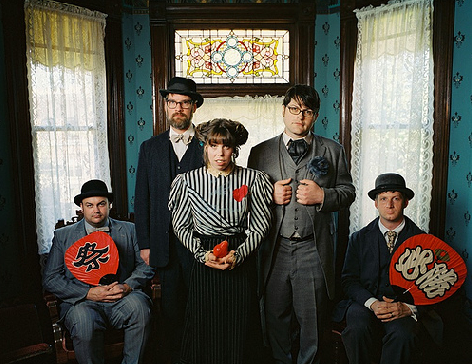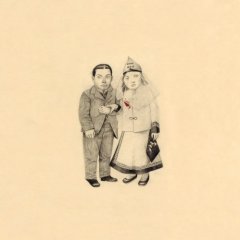
Several people will probably want to crucify me for saying this, but I greatly, greatly disliked Picaresque. I would go so far as to say that I hate it, except that there are two songs on it that are quite glorious.
The Decemberists: “We Both Go Down Together” (download)
The Decemberists: “The Engine Driver” (download)
These two songs aside, every time I hear a song from that album, it reminds me of the various (better) songs on Castaways & Cutouts and Her Majesty that they’re biting off of. I would attempt to point out these compairisons in detail for you, but these two songs aside, I took Picaresque off of my computer, because I disliked it that much. Not only did it seem like they were just trying to mimic previously successful formulas for their songs, but it was just plain boring. I’m aware of the fact that I’m one of the few that thinks this, so if you’re going to comment just to tell me that you disagree, don’t bother (unless you think you have a particularly compelling argument, in which case, I’d love to hear it).
Part of the reason I feel this way, I think, is because Picaresque was a highly unexpected turn for them after something like the Tain. For those of you unfamiliar with it, the Tain is a nearly 20-minute opus comprised of five movements or parts that are all strung together in one track. Yes, it occasionally takes inspiration from classic rock acts like Zeppelin and Floyd, but it’s also the sound of the Decemberists letting their hair down and writing some incredibly unique and beautiful music. The Tain hinted at something unusual and interesting off in the distance. But what we got instead was an album mostly comprised of four-minute pop songs that were clearly designed to be so accessible that they were, in turn, boring (yes, there are songs longer than four minutes, but they too are yawn-tastic). After Picaresque came out, I didn’t listen to the Decemberists for a very, very long time.

When people started talking about the Crane Wife, I couldn’t help but feel hesitant. When “O Valencia” started circulating, I was even more hesitant. Was this all we had to look forward to? Another album of mediocre tracks that don’t hold up to the best of their previous works? Still, the Crane Wife made its way into my hands. The answer(s)? Yes and no.
The biggest difference between the Crane Wife and Picaresque is probably the most important. Picaresque was more designed for the single-song playlist-oriented segment of the market. If you listen to just one song without the context of the entire album, it’s not such a tragedy. In other words, Picaresque is an album by today’s standards. The Crane Wife, however, is an album more fit to the standards of 20-30 years ago. There aren’t a lot of songs that you can cut out of it and just listen to alone. The whole album functions a lot better if you have the whole thing and listen to it all at once. But don’t fret, that won’t stop me from talking about single songs.
The Decemberists: “Yankee Bayonet (I Will Be Home Then)” (download)
“Yankee Bayonet” holds up with some of the best of the Decemberists’ work. This duet with Laura Viers has everything that attracted people to the Decemberists when they first started. It achieves the same heart-breaking beauty as their quicker-paced ballads like “The Bachelor and the Bride,” or “Here I Dreamt I Was An Architect,” but unlike most of the material off of Picaresque, it isn’t the musical equivalent of throwing a new cover on the same old couch.
Speaking of not throwing a new cover on the same old couch, the Decemberists make a somewhat successful attempt at a style that for some reason makes me think of the Talking Heads with “The Perfect Crime No.2” (The Talking Heads probably isn’t the best example, but they’re the band that comes to mind.)
The Decemberists: “The Perfect Crime No.2” (download)
The first half is, without a doubt, the strongest. The album starts to drag a bit towards the middle-end, but the second half is not without merit. “The Crane Wife 1 & 2” will appeal to fans of The Tain, as will “The Island: Come And See/The Landlord’s Daughter/You’ll Not Feel the Drowning.” Those of you more attached to Picaresque may skip over them, but I beg you to listen to them, and to listen intently. They contain some of the better parts of the album, the last two minutes of “The Island…” especially. Skipping the second half entirely is also a mistake, because “Sons and Daughters” posesses some of the same spirit as Castaways & Cutouts closer, “California Brigade/Youth and Beauty Brigade,” and because listening to the last three tracks all together makes for a filling closing.
The Decemberists: “Sons and Daughters” (download)
Does the Crane Wife show the same level of inventiveness and sprit that Castaways & Cutouts and Her Majesty do? At the best times, yes, at the worst times, no. The back-to-back duo of “When The War Came” and “The Shankill Butchers” is pretty snooze-worthy — but C&C and Her Majesty weren’t entirely flawless, so expecting the Crane Wife to be is asking a lot.
One of the most interesting things about this album is where it leaves our heroes. It seems like they’ve done as much as they can with retaining as much of their original aesthetic as they can. Will they lean more towards a genre make-over, as “The Perfect Crime No.2” hints? Or will they just keep doing what they’ve been doing this whole time? Wondering where they’ll go next is almost as fun as listening to the Crane Wife. Almost.


8 comments
Py Korry says:
Oct 16, 2006
This group was so very popular among the alt set in Portland when I was there this summer. I listened to a few of their songs and wasn’t too impressed, but some of the selections here are pretty good. When you said: “The Perfect Crime No.2″ (The Talking Heads probably isn’t the best example, but they’re the band that comes to mind.)” you were spot on. Before I read your post I listened to the songs and from the opening, I thought of the Talking Heads as well.
Taylor says:
Oct 16, 2006
Oh yes, Portland has big hometown pride for these boys & girls. Their second album, “Her Majesty” is probably my favorite, but I know a lot of people who prefer “Castaways & Cutouts.”
Whew, I’m glad I wasn’t the only one to think Talking Heads. I kind of hate comparing bands, and partly because I’m not very good at it, hah.
Music Look » БлогоÑкоп â„–7 says:
Oct 23, 2006
[…] Ðльбом недели ÐŸÑ€Ð¾ÑˆÐµÐ´ÑˆÐ°Ñ Ð½ÐµÐ´ÐµÐ»Ñ Ð±Ñ‹Ð»Ð° довольно бедной на новые релизы, поÑтому Ñамые интереÑные обÑÑƒÐ¶Ð´ÐµÐ½Ð¸Ñ Ð²ÐµÐ»Ð¸ÑÑŒ вокруг вышедшего ещё в начале октÑÐ±Ñ€Ñ Ð°Ð»ÑŒÐ±Ð¾Ð¼Ð° “The Crane Wife†группы The Decemberists, играющей Ñтаромодный (в хорошем ÑмыÑле Ñлова) поп-фолк. Так, Chromewaves раÑÑуждает о том, как повлиÑл на музыку «ДекабриÑтов» переход на лейбл-мейджор Capitol, а блог T-Sides Ñравнивает “The Crane Wifeâ€ Ñ Ð¿Ñ€ÐµÐ´Ñ‹Ð´ÑƒÑ‰Ð¸Ð¼ альбомом The Decemberists, “Picaresqueâ€. […]
T-Sides » Blog Archive » T-Sides Best of 2006 Extravaganza: Top Albums & Songs says:
Jan 2, 2007
[…] 10. The Decemberists, The Crane Wife You can read my extensive review here, but basically, the Decemberists’ move from disposable pop to a long song form and an aesthetic that seems more natural to them is an absolute relief. This is the proper follow-up to The Tain that Picaresque wasn’t. […]
WankleRotaryEngine says:
Feb 2, 2007
Hmm… I can totally see what you are saying about these two albums. Unfortunatly, I expect that as the music market moves away from the purchase of albums and more toward the purchase of single tracks, it will be increasingly rare that artists make CDs like The Crane Wife, Sargeant Pepper, or Desperado. Even though I’m not a huge fan of the Decemberists, I like the idea and find it much more engaging than a series of unrelated songs!
Cheers,
WRE
Steve P. says:
Aug 7, 2007
I defintely disagree with you on Picaresque because I love that album. However I find it odd that you that you asume that just because someone likes that album they won’t like Crane Wife. They are different albums but I like them both very much and really can’t decide which one is better at times.
Taylor says:
Aug 9, 2007
Nowhere do I state or imply that if you like one you can’t like the other – that would be an ignorant comment on my part. Personally, I didn’t like Picaresque, so I was writing why, in my opinion, I feel the Crane Wife is the superior album.
T-Sides Best of 2006 Extravaganza: Top Albums & Songs | T-Sides says:
Mar 23, 2011
[…] The Decemberists, The Crane Wife You can read my extensive review here, but basically, the Decemberists’ move from disposable pop to a long song form and an […]